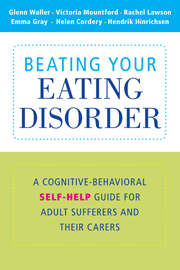References cited in this book
Abraham, S., & Llewellyn-Jones, D. (1992). Eating Disorders: The Facts, 3rd edition. Oxford: Oxford University Press.
Bo-Linn, G. W., Santa Ana, C. A., Morawski, S. G., & Fordtran, J. S. (1983). Purging and calorie absorption in bulimic patients and normal women. Annals of Internal. Medicine, 99, 14–17.
Fairburn, C. G., & Harrison, P. J. (2003). Eating disorders. Lancet, 361, 407–416.
Garner, D. M., & Garfinkel, P. E. (1997). Handbook of Treatment for Eating Disorders, 2nd edition. New York, NY: Guilford.
Gauntlett-Gilbert, J., & Grace, C. (2005). Overcoming Weight Problems. London: Robinson.
Highet, N., Thompson, M., & King, R. M. (2005). The experience of living with a person with an eating disorder. Eating Disorders: The Journal of Treatment and Prevention, 13, 327–344.
Kaye, W. H., Weltzin, T. E., Hsu, L. K., McConaha, C. W., & Bolton, B. (1993). Amount of calories retained after binge eating and vomiting. American Journal of Psychiatry, 150, 969–971.
Keys, A., Brozek, J., Henschel, A., Mickelsen, O., & Taylor, H. L. (1950). The Biology of Human Starvation. Minnesota, MN: University of Minnesota Press.
National Institute for Health and Clinical Excellence (2004). Eating disorders: core interventions in the treatment and management of anorexia nervosa, bulimia nervosa and related eating disorders. Clinical Guideline 9. London, UK: National Collaborating Centre for Mental Health.
Treasure, J., Murphy, T., Szmukler, G., et al. (2001). The experience of caregiving for severe mental illness: a comparison between anorexia nervosa and psychosis. Social Psychiatry and Psychiatric Epidemiology, 36, 343–347.
Treasure, J., & Schmidt, U. (2008). Motivational interviewing in eating disorders. In Motivational Interviewing and the Promotion of Mental Health, ed. Arkowitz, H.,Westra, H., Miller, W. R., & Rollnick, S.New York, NY: Guilford Press, pp. 194–224.
Treasure, J., Smith, G., & Crane, A. (2007). Skills-based Learning for Caring for a Loved One with an Eating Disorder: The New Maudsley Method. London: Routledge.
Waller, G., Cordery, H., Corstorphine, E., et al. (2007). Cognitive Behavioral Therapy for the Eating Disorders: A Comprehensive Treatment Guide. Cambridge: Cambridge University Press.



